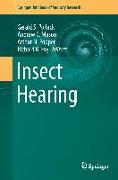- Start
- Insect Hearing
Insect Hearing
Angebote / Angebote:
Insect Hearing provides a broadly based view
of the functions, mechanisms, and evolution of hearing in insects. With a
single exception, the chapters focus on problems of hearing and their
solutions, rather than being focused on particular taxa. The exception, hearing in Drosophila, serves as a case study of one of the most important model systems in neurobiology, including the neurobiology of hearing. Auditory systems, whether insect or vertebrate, must perform a number of basic
tasks: capturing mechanical stimuli and transducing these into neural activity,
representing the timing and frequency of sound signals, distinguishing between
behaviorally relevant signals and other sounds and localizing sound sources.
Studying how these are accomplished in insects offers a valuable comparative
view that helps to reveal general principles of auditory function.
·
Introduction to Insect Acoustics by Andrew C. Mason and Gerald S. Pollack
·
Evolution of Acoustic Communication in Insects by Michael D. Greenfield
·
Behavioral Ecology of Insect Acoustic Communication by Rohini Balakrishnan
·
Hearing for Defense by Gerald S. Pollack
·
Vibrational Signaling by Jayne Yack
·
Mechanical Specializations of Insect Ears by James F. C. Windmill and
Joseph C. Jackson
·
Auditory Transduction by Daniel F. Eberl, Azusa Kamikouchi, and Joerg T. Albert
·
Central Neural Processing of Sound Signals in Insects by Berthold Hedwig and Andreas Stumpner
·
Information Processing in the Auditory Pathway of Insects
by Bernhard Ronacher
·
Hearing in Drosophila
by Azusa Kamikouchi and Yuki Ishikawa
About the Editors:
Gerald Pollack is a Professor Emeritus in the Department
of Biology at McGill University.
Andrew Mason is Associate Professor & Chair in the
Department of Biological Sciences at the University of Toronto, Scarborough.
Richard R. Fay is Distinguished Research Professor of
Psychology at Loyola University Chicago.
Arthur N. Popper is Professor Emeritus and Research Professor
in the Department of Biology at the University of Maryland, College Park.
About the Series:
The Springer Handbook of Auditory
Research presents a series of synthetic reviews of fundamental topics dealing
with auditory systems. Each volume is independent and authoritative, taken as a
set, this series is the definitive resource in the field.
Folgt in ca. 15 Arbeitstagen
